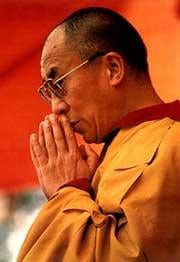Introduction
Words of Truth was composed by His Holiness Tenzin Gyatso, the Fourteenth Dalai Lama of Tibet, during the autumn of 1960, a year and a half after he was forced into exile in India. It is one of the most important prayers for Tibetans today. It is recited each morning with their daily prayers and sung to a medley of four lovely melodies on occasions such as the March 10 Uprising Day observance.
For Tibetans there is no separation between the sacred and the secular. Accordingly, this prayer finds a place in both arenas. Words of Truth is dedicated to restoring peace, the Buddhist teachings, and the culture and self-determination of the Tibetan people in their homeland. It is also an invocation of compassion towards all suffering sentient beings: oppressor and oppressed alike.
Prayer serves most immediately to focus the thoughts toward a specific end, in this case the preservation of Tibetan civilization and the goal of universal compassion. Prayer is also a refined expression of a state of mind, of an inner vision. Prayer is a crown jewel of speech. Speech is intimately tied to the breath, the coarse form of energy that empowers the mind’s awareness. While all speech has such subtle power as its basis, prayer (recited or sung) is a carefully crafted mode of speech—a vital channel into the depths of the mind.
Thus, one truly can appreciate the significance and beauty of His Holiness’s Words of Truth. May its multifold repetition in the Tibetan, and now English, language contribute to the goal of compassionate liberation for all sentient beings.
Peter Gold
Dharamsala
India
Words of Truth
A Prayer Composed by His Holiness Tenzin Gyatso The Fourteenth Dalai Lama of Tibet,
Honoring and Invoking the Great Compassion of the Three Jewels; the Buddha, the Teachings, and the Spiritual Community
O Buddhas, Bodhisattvas, and disciples
of the past, present, and future:
Having remarkable qualities
Immeasurably vast as the ocean,
Who regard all helpless sentient beings
as your only child;
Please consider the truth of my anguished pleas.
Buddha's full teachings dispel the pain of worldly
existence and self-oriented peace;
May they flourish, spreading prosperity and happiness through-
out this spacious world.
O holders of the Dharma: scholars
and realized practitioners;
May your ten fold virtuous practice prevail.
Humble sentient beings, tormented
by sufferings without cease,
Completely suppressed by seemingly endless
and terribly intense, negative deeds,
May all their fears from unbearable war, famine,
and disease be pacified,
To freely breathe an ocean of happiness and well-being.
And particularly the pious people
of the Land of Snows who, through various means,
Are mercilessly destroyed by barbaric hordes
on the side of darkness,
Kindly let the power of your compassion arise,
To quickly stem the flow of blood and tears.
Those unrelentingly cruel ones, objects of compassion,
Maddened by delusion's evils,
wantonly destroy themselves and others;
May they achieve the eye of wisdom,
knowing what must be done and undone,
And abide in the glory of friendship and love.
May this heartfelt wish of total freedom for all Tibet,
Which has been awaited for a long time,
be spontaneously fulfilled;
Please grant soon the good fortune to enjoy
The happy celebration of spiritual with temporal rule.
O protector Chenrezig, compassionately care for
Those who have undergone myriad hardships,
Completely sacrificing their most cherished lives,
bodies, and wealth,
For the sake of the teachings, practitioners,
people, and nation.
Thus, the protector Chenrezig made vast prayers
Before the Buddhas and Bodhisativas
To fully embrace the Land of Snows;
May the good results of these prayers now quickly appear.
By the profound interdependence of emptiness
and relative forms,
Together with the force of great compassion
in the Three Jewels and their Words of Truth,
And through the power
of the infallible law of actions and their fruits,
May this truthful prayer be unhindered
and quickly fulfilled.
[You can also download the Words of Truth booklet, which contains the English translation, versification into lyrics and music notation, and Tibetan phonetics and script.]































